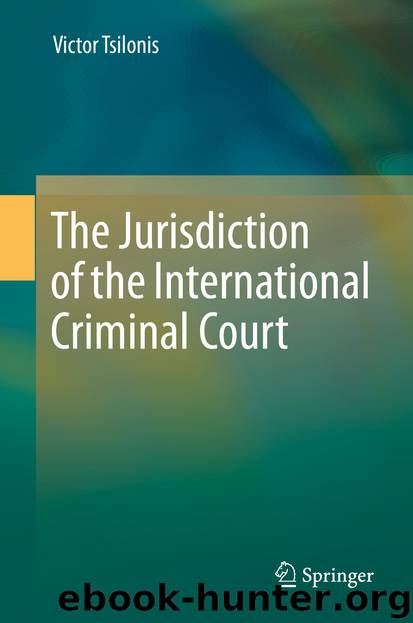The Jurisdiction of the International Criminal Court by Victor Tsilonis

Author:Victor Tsilonis
Language: eng
Format: epub
ISBN: 9783030215262
Publisher: Springer International Publishing
5.3 The Terms “Armed Conflict” and “Within the Established Framework of International Law”
The concept of armed conflict is crucial for all four categories of war crimes in Article 8 ICCRSt. The difference between them is that the first two categories—i.e. “grave breaches of the Geneva Conventions of 12 August 1949 (on international armed conflicts)”33 and “other serious violations of the laws and customs applicable in international armed conflict, within the established framework of international law”34—indirectly but clearly require the existence of an international armed conflict as a precondition for their commission, while the next two—i.e. “in the case of an armed conflict not of an international character, serious violations of article 3 common to the four Geneva Conventions of 12 August 1949”35 and “other serious violations of the laws and customs applicable in armed conflicts not of an international character, within the established framework of international law”36—require the existence of an armed conflict that is not of an international character.37
Therefore, it appears that the ICC currently has no jurisdiction over the isolated or short use of force. Thus, for instance, the mission to kill Osama Bin Laden in Pakistan38 could never be considered a war crime—even if Pakistan were a state party to the ICCRSt—, since it was not committed in the context of an international armed conflict or of an armed conflict not of an international character. With regards to what exactly constitutes an armed conflict, this seems to exist when at least one of the two parties believes that it is at war with the other, even if war has not officially been declared. Thus, for instance, the bombing and occupation of Corfu by Italians in 1923 or Japan’s invasion of Manchuria in 1931 constituted acts in the context of an armed conflict, even though they were committed without a formal declaration of war. In other words, what is crucial here is what is truly happening and how a State or a party (in an armed conflict not of an international character) interprets a relationship in practice. As pointed out by Kolb and Hyde, if at least one party considers itself in a state of war, even if it has not officially declared that view, then an armed conflict exists.39
Download
This site does not store any files on its server. We only index and link to content provided by other sites. Please contact the content providers to delete copyright contents if any and email us, we'll remove relevant links or contents immediately.
| Elections & Political Process | Ideologies & Doctrines |
| International & World Politics | Political Science |
| Public Affairs & Policy | Specific Topics |
| United States |
The Secret History by Donna Tartt(19052)
The Social Justice Warrior Handbook by Lisa De Pasquale(12187)
Thirteen Reasons Why by Jay Asher(8893)
This Is How You Lose Her by Junot Diaz(6877)
Weapons of Math Destruction by Cathy O'Neil(6265)
Zero to One by Peter Thiel(5786)
Beartown by Fredrik Backman(5737)
The Myth of the Strong Leader by Archie Brown(5499)
The Fire Next Time by James Baldwin(5431)
How Democracies Die by Steven Levitsky & Daniel Ziblatt(5215)
Promise Me, Dad by Joe Biden(5141)
Stone's Rules by Roger Stone(5081)
A Higher Loyalty: Truth, Lies, and Leadership by James Comey(4954)
100 Deadly Skills by Clint Emerson(4921)
Rise and Kill First by Ronen Bergman(4779)
Secrecy World by Jake Bernstein(4741)
The David Icke Guide to the Global Conspiracy (and how to end it) by David Icke(4707)
The Farm by Tom Rob Smith(4502)
The Doomsday Machine by Daniel Ellsberg(4484)
